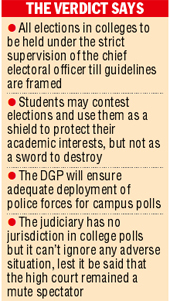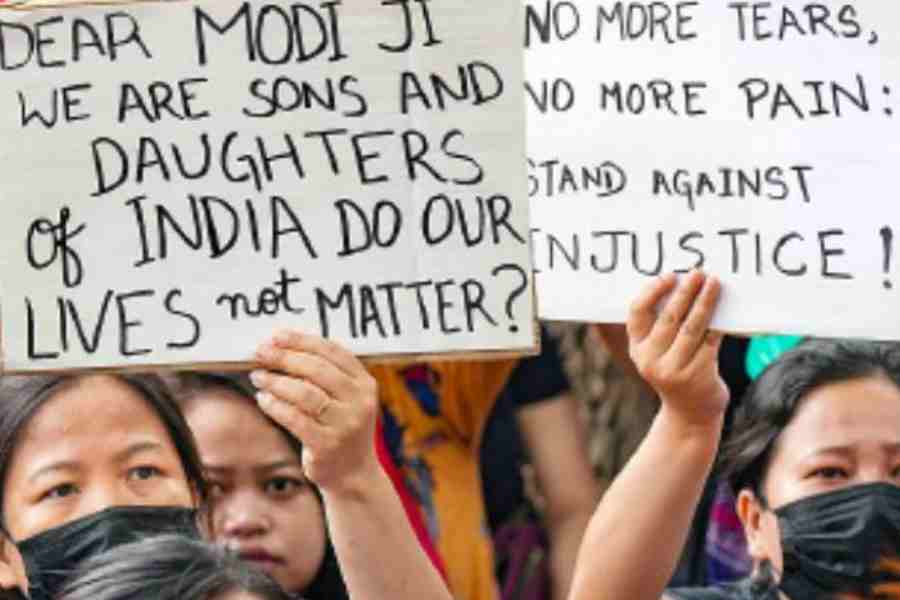 |
Calcutta High Court on Wednesday took the campus-poll bull by the horns, asking the chief electoral officer of Bengal to take charge of all college elections and advising students to stick to studies.
“This court directs that all elections in colleges be held under the strict supervision of the chief electoral officer, West Bengal, till guidelines are framed. The CEO will be entitled to seek the assistance of the director-general of police to conduct the elections peacefully,” Justice Tapen Sen said in his 30-page verdict on petitions challenging the stay on union elections in at least 15 colleges.
For those smarting from judicial intervention in campus polls, the judge had a word of caution couched in the language of advice.
“This court would also take a moment to advise the students to concentrate more on their studies and refrain from identifying themselves with any particular organisation…. In the prime of their youth, they are supposed to study and become responsible future generations of our country,” Justice Sen said.
The judge added: “Students may contest elections, but such elections should be purely student elections and should be used as a shield to protect their academic interests, not as a sword to destroy.”
The court requested the seven-member committee formed by the government on February 21 to quickly give its suggestions on how to implement the Delhi-appointed Lyngdoh Commission’s recommendations on depoliticising campus polls.
Some academicians welcomed the court’s order, saying student unions responsible for turning campuses into a cauldron had it coming. A few like the vice-chancellor of a state university, however, questioned how a chief electoral officer could oversee elections governed by rules framed for individual institutions.
“So will filing and withdrawal of nominations be henceforth overseen by the chief electoral officer? In the event of anomalies being detected, who will hear the complaints? The government will have a tough time creating space for the chief electoral officer and the college authorities in the election process,” the vice-chancellor said.
The court’s order makes it clear that the college authorities “must render complete and total support” to the chief electoral officer. “In the event the CEO finds that there is any violence or beach of discipline or want of co-operation, he will be free to reschedule the elections or to take such other steps as may be permissible under the law.”
Chief electoral officer Sunil Kumar Gupta declined to comment till he received a copy of the order. “I am aware of the judiciary’s instructions, but I am yet to receive the relevant documents. I must not comment on this till I have gone through what the court has said.”
The case had originated from a spate of violence and controversies surrounding elections in colleges across the state. The court had initially refused to admit the series of petitions filed by the CPM-affiliated Students Federation of India (SFI), challenging the fairness of the electoral process in Dinabandhu Andrews College, KK Das College and Prafulla Chandra College in south Calcutta, Jhargram Raj College in West Midnapore and Rathbari College in Malda.
Justice Sen took it up only after the SFI lawyers argued that this wasn’t just a question of the Trinamul student union allegedly subverting the electoral process, but also of the government’s failure to implement the recommendations of the Lyngdoh Commission.
Wednesday’s verdict states that the high court cannot entertain petitions on campus elections not governed by rules framed by the state or the universities.
So why did the court bring college elections under the interim jurisdiction of the chief electoral officer? “It certainly has the jurisdiction to frown on any adverse situation prevailing in these areas, lest it be said that even the high court remained a mute spectator,” states the order.
The Trinamul Congress Chhatra Parishad questioned the order without criticising it. “We fail to understand why there was no such intervention during 34 years of Left Front rule, when campus polls amounted to selection rather than election,” complained Baiswanar Chattapadhyay, a former general secretary of the student wing.
If the SFI wasn’t expecting the court to give such a verdict, its leadership didn’t show it. “The court had to recommend an unprecedented step as the law-and-order machinery has failed to prevent campus violence,” said Ritabrata Banerjee, the all-India general secretary of the SFI.










